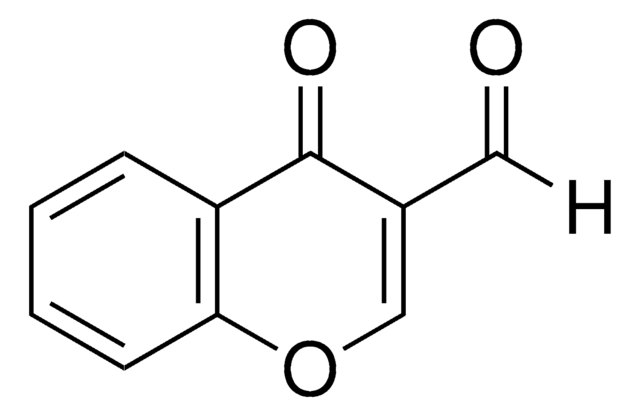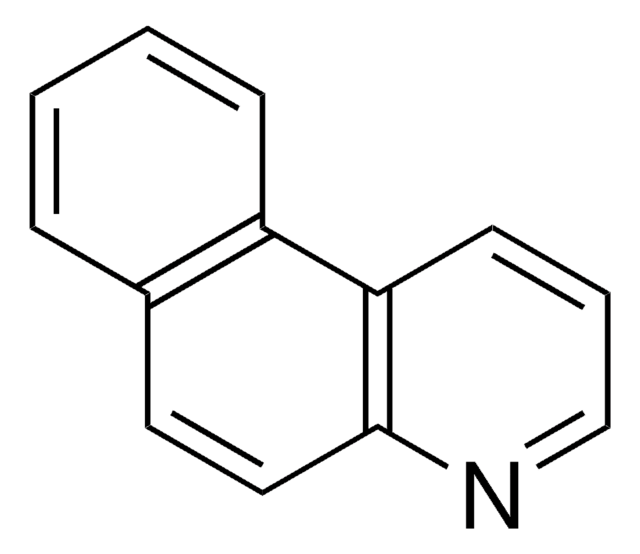301841
1,7-Phenanthroline
99%
Iniciar sesiónpara Ver la Fijación de precios por contrato y de la organización
About This Item
Fórmula empírica (notación de Hill):
C12H8N2
Número de CAS:
Peso molecular:
180.21
MDL number:
UNSPSC Code:
12352100
PubChem Substance ID:
NACRES:
NA.22
Productos recomendados
Quality Level
assay
99%
form
solid
mp
79-81 °C (lit.)
SMILES string
c1cnc2c(c1)ccc3ncccc23
InChI
1S/C12H8N2/c1-3-9-5-6-11-10(4-2-7-13-11)12(9)14-8-1/h1-8H
InChI key
OZKOMUDCMCEDTM-UHFFFAOYSA-N
General description
1,7-Phenanthroline has inhibitory effect on germination and growth of plants. 1,7-Phenanthroline is an aza-analog of phenanthrene, was found to be mutagenic in the Ames test using Salmonella typhimurium TA100 in the presence of a rat liver S9 fraction. Supramolecular assemblies of 1,2,4,5-benzenetetracarboxylic acid with 1,7-phenanthroline (aza donor molecule) were investigated.
signalword
Danger
hcodes
Hazard Classifications
Acute Tox. 3 Oral - Aquatic Acute 1 - Aquatic Chronic 1 - Eye Dam. 1
Storage Class
6.1C - Combustible acute toxic Cat.3 / toxic compounds or compounds which causing chronic effects
wgk_germany
WGK 3
flash_point_f
Not applicable
flash_point_c
Not applicable
ppe
dust mask type N95 (US), Eyeshields, Faceshields, Gloves
Elija entre una de las versiones más recientes:
¿Ya tiene este producto?
Encuentre la documentación para los productos que ha comprado recientemente en la Biblioteca de documentos.
Los clientes también vieron
Martin Saurer et al.
Science (New York, N.Y.), 365(6458), 1144-1149 (2019-09-14)
Mitochondrial ribosomes (mitoribosomes) are large ribonucleoprotein complexes that synthesize proteins encoded by the mitochondrial genome. An extensive cellular machinery responsible for ribosome assembly has been described only for eukaryotic cytosolic ribosomes. Here we report that the assembly of the small
Wei Xiao et al.
Environmental science & technology, 52(1), 114-123 (2017-12-06)
Iron (oxyhydr)oxides are widespread in natural and engineered systems, potent adsorbents of contaminants and a source of energy for iron-reducing bacteria. Microbial reduction of iron (oxyhydr)oxides results in the formation of Fe(II) which can induce the transformation of these iron
Veronika Paková et al.
Environmental toxicology and chemistry, 25(12), 3238-3245 (2007-01-16)
N-heterocyclic derivatives of polycyclic aromatic hydrocarbons (NPAHs) are widespread concomitantly with their parent analogues and have been detected in air, water, sediments, and soil. Although they were shown to be highly toxic to some organisms, our understanding of their occurrence
Kapildev K Arora et al.
The Journal of organic chemistry, 68(24), 9177-9185 (2003-11-25)
Supramolecular assemblies of 1,2,4,5-benzenetetracarboxylic acid, 1, with aza donor molecules such as 1,10-phenanthroline, 2, 1,7-phenanthroline, 3, phenazine, 4, 4-(N,N-dimethylamino)pyridine, 5, 1,2-bis(4-pyridyl)ethene, 6, and 1,2-bis(4-pyridyl)ethane, 7, have been synthesized and characterized by single-crystal X-ray diffraction methods. All the complexes crystallize in
Selvaraj Vimalraj et al.
Colloids and surfaces. B, Biointerfaces, 167, 134-143 (2018-04-11)
Zinc silibinin complex [Zn(sil)(H2O)2] and mixed ligand zinc complexes such as Zn(silibinin)(phenanthroline) [Zn(sil)(phen)], and Zn(silibinin)(neocuproine) [Zn(sil)(neo)] have been synthesized and characterized. The UV-vis spectra of the Zn(II) complexes showed a considerable shift in the intra-ligand transition. From the IR spectra
Nuestro equipo de científicos tiene experiencia en todas las áreas de investigación: Ciencias de la vida, Ciencia de los materiales, Síntesis química, Cromatografía, Analítica y muchas otras.
Póngase en contacto con el Servicio técnico



![Benzo[h]quinoline 97%](/deepweb/assets/sigmaaldrich/product/structures/344/715/928932d2-4ca4-4402-b56c-85a80100ce17/640/928932d2-4ca4-4402-b56c-85a80100ce17.png)










